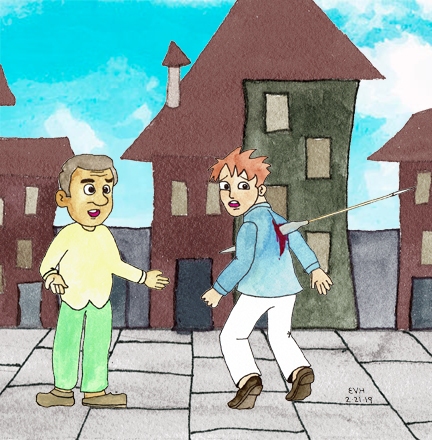
Jataka 116
Dubbaca Jātaka
Headstrong
as told by Eric Van Horn
originally translated by Robert Chalmers, B.A., of Oriel College, Oxford University
originally edited by Professor Edward Byles Cowell, Cambridge University
This is another story about stubbornness. A common theme in the Pāli Canon is people who do not listen to the advice of “the wise.” There are many monks who would not even listen to the Buddha. Buddhist practice at different times requires both self-confidence in your ability to master the practice, and humility in order to follow the guidance of your teachers. This does not mean blind acceptance, of course, but it is very hard to progress if you only follow your own opinions.
“Too many.” This story was told by the Master while he was at Jetavana. It is about a headstrong monk whose own story will be given in the Gijjha Jātaka. (Jātaka 427. This is a story about a monk who thought he knew what was best for him and did not listen to his teachers. In Jātaka 427 story the headstrong monk was a vulture who ignored warnings and flew too far away from his home country. He was killed as a result. The word “gijjha” means “vulture.”)
The Master rebuked him with these words, “As you do now, so in former days you were headstrong, brother, disregarding the advice of the wise and good. Because of this you were killed by a javelin.” So saying, he told this story of the past.
Once upon a time when Brahmadatta was reigning in Benares, the Bodhisatta was born into an acrobat’s family. When he grew up, he was a very wise and clever fellow. He learned the “javelin dance” from another acrobat, and he and his master used to travel about exhibiting his skill. Now this master of his knew the four-javelin dance but not the five-javelin dance. One day when performing in a certain village, the master set up five javelins in a row and announced that he would dance through all of them.
Unfortunately, he had been drinking. The Bodhisatta said to him, “You will not be able to manage all five javelins, master. Take one of them away. If you try all five, you will be run through by the fifth one, and you will die.”
“You don’t know what I can do when I try,” said the drunken fellow. And ignoring the Bodhisatta’s warning, he danced through four of the javelins only to be run through on the fifth one like the Bassia flower on its stalk. (The Bassia flower is shaped like a spear.) As he lay groaning, the Bodhisatta said, “This disaster is because you ignored the counsel of the wise and good.” Then he uttered this stanza:
Greatly against my will, too much you tried.
Clearing the four, on the fifth you died.

Figure: No, it isn’t just a metaphor
So saying, he lifted his master off of the javelin point and duly performed the last duties over his body. (In Hinduism and Buddhism the “last duties” are a ritual bathing of the body.)
His story done, the Master identified the birth by saying, “This headstrong monk was the master of those days, and I was the pupil.”
